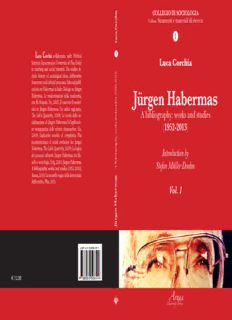Table Of Contenta COLLEGIO DI SOCIOLOGIA
i
ch Collana Strumenti e materiali di ricerca
r
o
C
a q
c
u
L
L C q
uca orchia collaborates with Political
Luca Corchia
Sciences Departmentat University of Pisa (Italy)
in teaching and social research. His studies in-
clude history of sociological ideas, deliberative 13)
0
democracy and cultural processes. Selected publi- 2
-
2
cations on Habermas include: Dialogo su Jürgen 5
9 Jürgen Habermas
Habermas. Le trasformazioni della modernità, s (1
con M. Ampola, Ets, 2007; Il concetto di moder- die
nità in Jürgen Habermas. Un indice ragionato, u
st A bibliography: works and studies
The Lab’s Quarterly, 2008; La teoria della so- d
n
cializzazione di Jürgen Habermas.Un’applicazio- ks a (1952-2013)
ne ontogenetica delle scienze ricostruttive, Ets, r
o
w
2009; Explicative models of complexity. The y:
reconstructions of social evolution for Jürgen h
p
a
Habermas, The Lab’s Quarterly, 2009; La logica gr Introduction by
dei processi culturali. Jürgen Habermas tra filo- blio
sofia e sociologia, Ecig, 2010; Jürgen Habermas. Bi Stefan Müller-Doohm
A bibliography: works and studies (1952-2010), A
Arnus, 2010; La nouvelle vague della democrazia
s
deliberativa, Plus, 2011. a
m
Vol. 1
r
e
b
a
H
n
e
g
r
ü
J
€ 12,00
University Books
Arnus
Edizioni Il Campano - ARNUS University Books
COLLEGIO DI SOCIOLOGIA
Collana di Strumenti e materiali di ricerca ● I
COMITATO SCIENTIFICO
Alessandro Bellan, Matteo Bianchin, Luca Bifulco, Matteo Bortolini,
Marco Burgalassi, Massimo Cerulo, Luca Corchia, Valentina Cremonesini,
Mariano Croce, Dimitri D’Andrea, Paolo Diana, Alberto Fragio Gistau,
Maurizio Ghisleni, Federica Gregoratto, Mariano Longo,
Domenico Maddaloni, Vincenzo Mele, Massimo Pendenza,
Mauro Piras, Walter Privitera, Luca Raffini, Massimo Rosati,
Angelo Salento, Marco Solinas, Italo Testa, Angelo Volpe
SEGRETARIO DI REDAZIONE
Marco Chiuppesi
Luca Corchia
Jürgen Habermas
A bibliography: works and studies
(1952-2013)
With an Introduction by Stefan Müller-Doohm
Edizioni Il Campano
Arnus University Books
Luca Corchia
Jürgen Habermas. A bibliography: works and studies (1952-2013). With an
Introduction by Stefan Müller-Doohm / Luca Corchia – Pisa : Edizioni Il
Campano – Arnus University Books, © 2013.
Collegio di sociologia, Collana di Strumenti e materiali di ricerca. Vol. I.
ISBN 978-886528-186-4
016 Bibliografie e cataloghi speciali. Filosofia, Scienze Sociali
300 Scienze Sociali. Filosofia e Teoria
La collana “Collegio di sociologia” garantisce rigore scientifico e metodologico
indipendentemente da contenuti specifici espressi dagli autori, in coerenza con la
legittimità della pluralità di possibili approcci sia di merito sia disciplinari.
Tutti i testi sono preventivamente sottoposti a tre referee anonimi.
Per informazioni e proposte: [email protected]
© 2013 by Edizioni Il Campano
Arnus University Books – Pisa
Via Cavalca, 67, 56100 Pisa, Italia
Tel. 050 580722
[email protected]
ISBN 978-886528-186-4
Le fotocopie per uso personale del lettore possono essere effettuate nei limiti del
15% di ciascun volume/fascicolo di periodico dietro pagamento alla SIAE del
compenso previsto dall’art. 68, comma 4, della legge 22 aprile 1941 n. 633.
Le riproduzioni per finalità di carattere professionale, economico o commerciale o
comunque per uso diverso da quello personale possono essere effettuate a seguito di
specifica autorizzazione rilasciata da AIDRO, Corso di Porta Romana n. 108, Mila-
no 20122, e-mail [email protected] e sito web www.aidro.org.
Contents
VOLUME 1
PARTISANSHIP FOR REASON
Stefan Müller-Doohm 9
A BIBLIOGRAPHY
Luca Corchia 17
1. Works of Jürgen Habermas (1952-2013) 27
VOLUME 2
2. Studies on Jürgen Habermas (1964-2013) 163
VOLUME 1
PARTISANSHIP FOR REASON1
Stefan Müller-Doohm
Jürgen Habermas once admitted to being “a polemical talent”, adding
by way of explanation that his discourses on the democratic sense of
self-purpose have been conducted “under the premise of discord”. Of
contentious spirit, he was no more willing to treat his opponents with
kindness than they were willing to spare him. A recent illustration of the
resulting animosity was a headline in “Cicero” magazine: “Forget
Habermas!” The issue contained an article fantasizing on whether the
ten-year-old Habermas was attracted by Nazi slogans as a member of
the Hitler Youth. Accusations of this kind are palpable evidence of the
price leftist German intellectuals have to pay for their political com-
mitment. Such attempts on the part of his critics – attempting to dis-
credit him as a person in order to evade debate on the substance of his
critical intellectual position and – stand in blatant contrast to the inter-
national acclaim Habermas otherwise enjoys, amply underscored by the
many honours and prestigious awards that have been heaped upon him.
Habermas is the contemporary philosopher, combining two mean-
ingful lives in one lifetime: One of them being the productive scholar of
repute, who as a philosopher created the ethics of discourse and as a so-
cial theorist elaborated the concept of communicative rationality: The
other being the public intellectual, who for many decades and with
seismographic intuition openly spoke out to remind society of its own
normative precepts and draw attention to their violation.
Political engagement – a sideline
Habermas first entered the arena of public dispute in 1953 with his
1 Cfr. S. Müller-Doohm, Habermas: Partisanship for Reason, in «Einblicke», 50, 2009, pp.
8-11; ed. or. compl. Parteilichkeit für Vernunft. Jürgen Habermas als Philosoph und öffentli-
cher Intellektueller, in «Forschung Frankfurt», 2, 2009, pp. 14-22.
Description:the research unit “Intellectuellensoziologie”, where, following publica- tion of his much acclaimed Adorno biography, he researches the public role of leading intellectuals, especially the life and work of Jürgen. Habermas. A short Habermas biography appeared in December 2008. A long intellect

